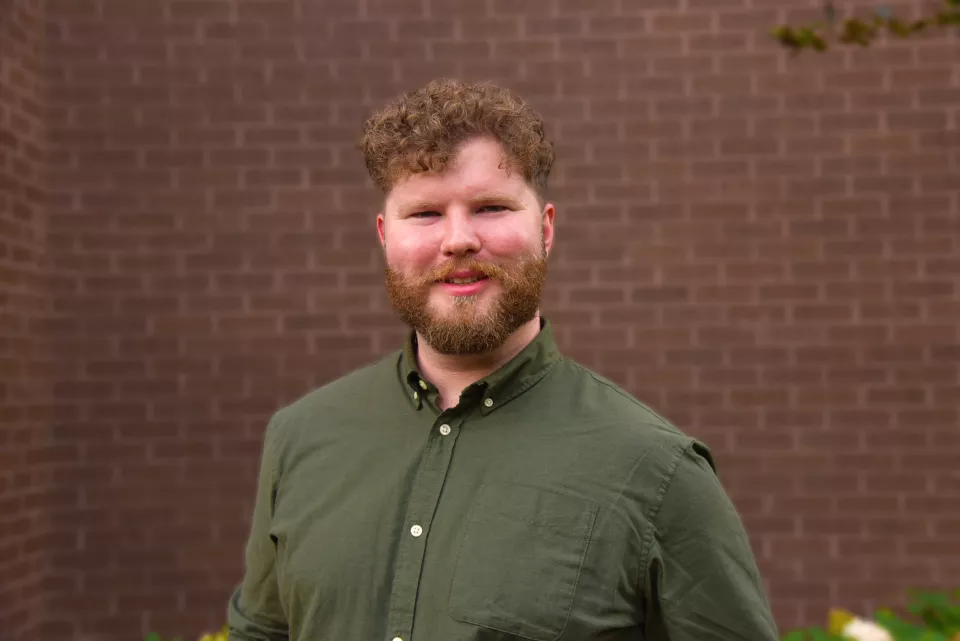Meet our Bernalite Adrian Hannon, a PhD researcher in biosensors and the development of a biosensing platform.
Adrian achieved great success by recently winning the best poster award in his category – Wearable to sustainable electrochemical sensing and biosensing - at the International Society of Electrochemistry Conference in Leon, France. The shock of winning stemmed from this conference being his international debut with regards to presenting his work to a plethora of people across many disciplines and not just in the remit of electrochemistry. This recent triumph has instilled a newfound confidence in Adrian, affirming that his research is heading in the right direction. He attributes much of his success to the unwavering support of his primary supervisor, Dr. Tadhg Kennedy, and his secondary supervisor, Dr. Kieran McGourty, both of whom have played pivotal roles in shaping his career. He has also had the privilege of collaborating with a wide array of disciplines, as he emphasizes, "Biosensing serves as a bridge connecting several domains and operates within an interdisciplinary framework." This unique position has enabled him to collaborate effectively with esteemed colleagues and mentors within the Bernal Institute, including Professors Kevin Ryan and Edmond Magner, as well as Dr. Micheál Scanlon. Currently, Adrian is actively engaged in cutting-edge research related to biosensors and the development of an advanced biosensing platform, further solidifying his position as a promising researcher in the field.
What does this mean?
Adrian designs the sensor architecture and the structures of the active site of the sensor. As well as the immobilisation layer or the bio recognition layer that's immobilised onto the surface which combined are used to capture a target. “Essentially you would attach a receptor to the surface, or immobilise an antibody to the surface, and depending on what you're detecting, there is a different antibody or antibody fragment that you can suitably utilise to capture your target. I use electrochemical techniques such as electrochemical impedance spectroscopy or EIS and fluorescent microscopy on the optical side of things, to develop the prototype. Although the EIS is my primary method of detection, I also use cyclic voltammetry, differential pulse voltammetry, and fluorescent microscopy to complement and characterise what's going on in the surface. While also utilising a whole range of material characterization methods.”
When asked to describe his work to a wider audience, Adrian explained:
“I would say that I'm designing and developing a sensor that will hopefully be as accessible and convenient as a Fitbit, phone or any devices used for detecting the next COVID or the early signs of a disease. This could be achieved by simply collecting a saliva or non-invasive sample that you can make accessible for point-of-care continuous monitorisation or having early positive/negative confirmation. Therefore, with this level of sensitivity and selectivity, it would have the capabilities to improve upon current antigen tests or current sensor technology, with reliability as the core deliverable.”
Why is this important?
Adrian is looking at developing a technology that addresses complex, difficult to detect targets such as pathogens, bacteria, viruses’, diseases, and biomarkers such as Cancer or Alzheimer's in the early development/diagnosis stage. He is developing the technologies architecture and designing a platform that is addressing various applications and targets with adaptability and reliability as the focus. He is also collaborating with different companies to tailor components of the design that supports companies’ areas of expertise and technological threshold. “I'm always looking through two lenses. The technology lens for industry which is immediately commercial and then the next generation lens, of where this work could head towards by looking at future applications.”
If his life could be a theme song Adrian said “More” by Sam Ryder. “The song is about doing more, spending more time with your friends, family, your loved ones, and also just going out there and living more.” We couldn’t agree ‘more’ Adrian. Congratulations on your recent success!
Best of luck in all your work, we are proud to call you a #Bernalite, from #BernalNeighbourhood.
